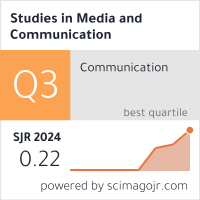Cultural and Behavioral Insights into European Social Media Users: Platform Preferences and Personality Types
Abstract
The study examines European social media personalities based on age, gender, platform preference, and country of origin. The research sample, which consists of respondents from 19 European countries (Albania, Bosnia & Herzegovina, Bulgaria, Czech Republic, Cyprus, France, Georgia, Germany, Greece, Italy, North Macedonia, Poland, Russia, Serbia, Slovenia, Spain, Sweden, Turkey, and the UK) reflects the general population ratio and predominantly includes middle-aged individuals ensuring representative findings. Almost two-thirds of respondents engage with social media daily, highlighting its pervasive role in European life. Analysis of platform preferences reveals that Facebook and Instagram are the most popular, while TikTok and Snapchat are less favored, particularly among older demographics. The study shows that gender differences are significant, with females favoring Facebook, Instagram, TikTok, and Snapchat, while males prefer LinkedIn and Twitter. This delineation underscores the varying social media consumption habits between genders. The study identifies three primary social media personalities: Lurkers, who passively consume content; Ultras, who exhibit obsessive usage; and Deniers, who balance regular use without dependency. Additional personalities include Ranters, Informers, and Peacocks, each representing unique motivations and engagement styles. This diversity in user behaviors highlights the multifaceted nature of social media engagement in Europe. A country-specific analysis reveals cultural and regional differences in social media use, with distinct preferences and behaviors emerging across Europe. For instance, Germans exhibit unique tendencies with a notable presence among Approval Seekers, Changelings, and Ghosts. Such variations underscore the importance of considering cultural contexts in social media strategies. The findings offer valuable insights for stakeholders, including marketers, policymakers, and platform developers. By understanding these diverse usage patterns, more effective campaigns can be designed, privacy and digital literacy issues can be addressed, and user experiences can be enhanced. This study underscores the integral role of social media in European life and provides a foundation for future research and strategy development.
Full Text:
PDFDOI: https://doi.org/10.11114/smc.v13i1.7306
Refbacks
- There are currently no refbacks.
Studies in Media and Communication ISSN 2325-8071 (Print) ISSN 2325-808X (Online)
Copyright © Redfame Publishing Inc.
To make sure that you can receive messages from us, please add the 'redfame.com' domain to your e-mail 'safe list'. If you do not receive e-mail in your 'inbox', check your 'bulk mail' or 'junk mail' folders.
If you have any questions, please contact: smc@redfame.com
------------------------------------------------------------------------------------------------------------------------------------------------------

